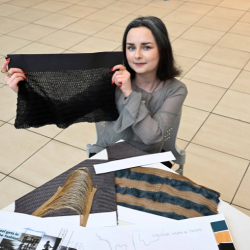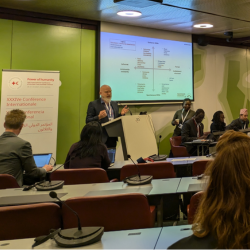-
Study
-
Quick Links
- Course Search
- Unlock Your Potential
- Still time to Apply
- Higher and Degree Apprenticeships
- Continuing Professional Development
- Book an Open Day
-
Undergraduate
- Course Search
- Application Guides
- UCAS Exhibitions
- Foundation Years
- Fees and Funding
- School & College Outreach
- Information for Parents
-
Postgraduate
- Course Search
- Application Guide
- Postgraduate Research Degrees
- Flexible Learning
- Fees and Funding
- Change Direction
- Register your Interest
-
Student Life
- Students' Union
- The Hub - Student Blog
- Accommodation
- Northumbria Sport
- Support for Students
-
Experience Northumbria
- Open Days & Events
- Virtual Tours
- Campus Tours
- Life in Newcastle
-
-
International
International
Northumbria’s global footprint touches every continent across the world, through our global partnerships across 17 institutions in 10 countries, to our 277,000 strong alumni community and 150 recruitment partners – we prepare our students for the challenges of tomorrow. Discover more about how to join Northumbria’s global family or our partnerships.
View our Global Footprint-
Quick Links
- Course Search
- Undergraduate Study
- Postgraduate Study
- Information for Parents
- London Campus
- Northumbria Pathway
- Sign up for Information
-
International Students
- Information for Students
- International Events
- Application Guide
- Entry Requirements and Education Country Agents
- Global Offices
- English Requirements
- English Language Centre
- International student support
-
International Fees and Funding
- International Undergraduate Fees
- International Undergraduate Funding
- International Masters Fees
- International Masters Funding
- International Postgraduate Research Fees
- International Postgraduate Research Funding
-
International Partners
- Agent and Representative Network
- Global Partnerships
- Global Community
-
International Mobility
- Information for Northumbria Students
- Information for Incoming Exchange Students
-
-
Business
Business
The world is changing faster than ever before. The future is there to be won by organisations who find ways to turn today's possibilities into tomorrows competitive edge. In a connected world, collaboration can be the key to success.
More on our Business Services -
Research
Research
Northumbria is a research-rich, business-focused, professional university with a global reputation for academic quality. We conduct ground-breaking research that is responsive to the science & technology, health & well being, economic and social and arts & cultural needs for the communities
Discover more about our Research -
About Us
-
About Northumbria
- Our Strategy
- Our Staff
- Place and Partnerships
- Leadership & Governance
- Academic Departments
- University Services
- History of Northumbria
- Contact us
- Online Shop
-
-
Alumni
Alumni
Northumbria University is renowned for the calibre of its business-ready graduates. Our alumni network has over 246,000 graduates based in 178 countries worldwide in a range of sectors, our alumni are making a real impact on the world.
Our Alumni - Work For Us
What will I learn on this module?
You will learn about the built environment of residential areas, housing policy and, especially, the relationship between housing and society. The module is firmly rooted within the contemporary paradigms of social geographical study and current debate. You will explore the role of ideological, social, economic and political influences on the evolution of the housing system in the UK and their influences upon residential environments. Students will analyse the relationships between housing developments and other socio-geographical phenomena, evaluate the role of housing and the housing system in the UK's social and spatial structures, and assess the merit of contrasting theories and interpretations of aspects of housing.
You will study the historical development of the housing system and its implications for the contemporary housing system and the evolution of local residential environments, before going on to look at housing outcomes and housing policies in relation to selected current issues.
How will I learn on this module?
You will learn through lectures, seminars, workshops, guest speakers and local field study visits. Your directed and independent study will be facilitated through your engagement with a range of supporting learning materials, guided by the e-reading list. This will enable you to consolidate your knowledge and understanding.
Lectures will be used to introduce you to and develop key theories, concepts and policies. This learning will be further developed through your involvement in discussions in seminars and workshops. Field study visits and guest speakers will then allow you to engage in the application of your learning to the real world.
Timely formative feedback, from tutors and peers, throughout your interactions with the learning process will strengthen your understanding in preparation for the completion of the assessment.
How will I be supported academically on this module?
Academic support for your learning will take place both within the formal teaching environment and outside of it. Within the scheduled teaching tutor and peer feedback will occur during discussions in the interactive, question driven lectures and workshops. This exposure to discussion and debates around the key concepts will develop and test your understanding. This understanding will then be applied to the assessment..
The scheduled study visits allow you to apply your understanding to local residential areas further testing your understanding within the context of application to the real world.
The eLP provides you with immediate access to learning materials, links and signposts to additional materials and opportunities for you to post questions to your tutors and peers.
What will I be expected to read on this module?
All modules at Northumbria include a range of reading materials that students are expected to engage with. Online reading lists (provided after enrolment) give you access to your reading material for your modules. The Library works in partnership with your module tutors to ensure you have access to the material that you need.
What will I be expected to achieve?
Knowledge & Understanding:
• MLO1: You will critically discuss the different theories and interpretations of housing phenomena.
• MLO2: You will critically evaluate the role of housing and the housing system in the creation of the residential built environment.
• MLO3: You will critically analyse the relationship between housing and residential, spatial outcomes for different groups.
Intellectual / Professional skills & abilities:
• MLO4: You will critically apply relevant theories and concepts.
Personal Values Attributes (Global / Cultural awareness, Ethics, Curiosity) (PVA):
• MLO5: You will demonstrate independent evidence based thinking.
How will I be assessed?
Formative feedback: interactive workshops, visits and guest speakers will provide opportunities to test your learning. Through debate and discussion there will be opportunities for formative feedback from peers and tutors allowing you to reflect on your knowledge and understanding prior to the summative assessment.
Summative assessment: This module has one assessment.
The assessment (accounting for 100% of the module mark) is a take-home exam paper; students will be required to select questions from two sections, testing across the module outcomes.
Pre-requisite(s)
N/A
Co-requisite(s)
N/A
Module abstract
The module aims to enable students to develop a wide ranging view of housing issues of relevance to contemporary society. You will explore the different influences that have shaped the housing systems and local residential environments, before going on to consider housing outcomes and policies in relation to current issues. Learning is delivered through lectures, workshops, visits and guest speakers, facilitating the application of theoretical and contextual understanding to real world application. Assessment is by a take away exam paper, supported by programme and module specific approaches to research rich learning. As well as learning about housing as a real world issue, and an area of policy and professional practice, the learning and assessment strategies will assist in developing skills of self-management and the ability to think independently and communicate effectively – supporting your transition into employment.
Course info
UCAS Code L700
Credits 20
Level of Study Undergraduate
Mode of Study 3 years Full Time or 4 years with a placement (sandwich)/study abroad
Department Geography and Environmental Sciences
Location City Campus, Northumbria University
City Newcastle
Start September 2025 or September 2026
All information is accurate at the time of sharing.
Full time Courses are primarily delivered via on-campus face to face learning but could include elements of online learning. Most courses run as planned and as promoted on our website and via our marketing materials, but if there are any substantial changes (as determined by the Competition and Markets Authority) to a course or there is the potential that course may be withdrawn, we will notify all affected applicants as soon as possible with advice and guidance regarding their options. It is also important to be aware that optional modules listed on course pages may be subject to change depending on uptake numbers each year.
Contact time is subject to increase or decrease in line with possible restrictions imposed by the government or the University in the interest of maintaining the health and safety and wellbeing of students, staff, and visitors if this is deemed necessary in future.
Useful Links
Find out about our distinctive approach at
www.northumbria.ac.uk/exp
Admissions Terms and Conditions
northumbria.ac.uk/terms
Fees and Funding
northumbria.ac.uk/fees
Admissions Policy
northumbria.ac.uk/adpolicy
Admissions Complaints Policy
northumbria.ac.uk/complaints









